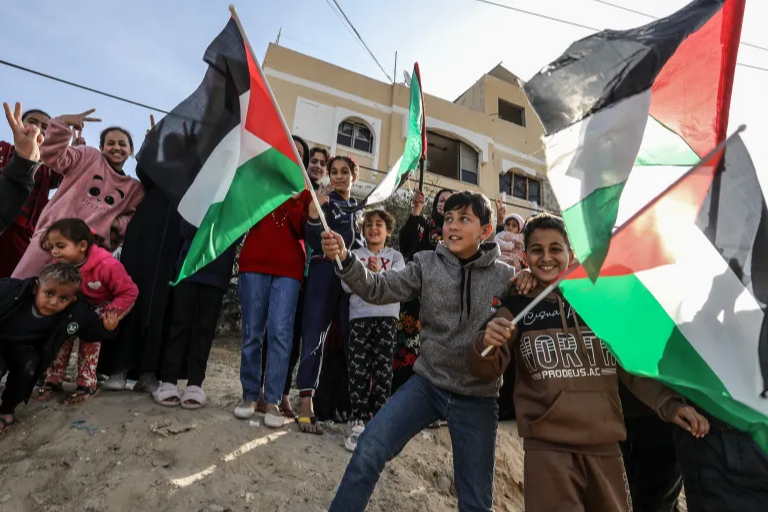
Children are waving Palestinian flags as Palestinians returning to Rafah city demonstrate their joy after the announcement of ceasefire and hostage-prisoner swap deal between Hamas and Israel on January 19, 2025 [Abed Rahim Khatib/Anadolu]
Gaza City, January 19 (RHC)-- Celebrations have erupted across the Gaza Strip after a much-awaited ceasefire came into effect following 15 months of war that turned much of the coastal Palestinian enclave to rubble.
The ceasefire came into effect at 11:15am local time (09:15 GMT) on Sunday after Hamas handed over a list of three female captives to be released as part of the deal to Israel through mediators.
“My joy is beyond measure,” said Gaza resident Om Salah. “From the moment they announced the ceasefire, I quickly packed all my things because I am ready to go to Gaza City. My children are extremely happy to go and see our families, relatives and our lands,” she told Al Jazeera.
“Here, we are always scared and worried, but back home we will be very happy, and joy will come back to our lives.”
A young Palestinian man said, “Everyone is happy, particularly the children.” “Hopefully, the Israelis will not violate it [ceasefire] in the next few days,” he told Al Jazeera.
He said all he wanted to do now was complete his education. “There have been loads of dreams destroyed during this genocide.”
Gaza’s health workers and rescuers were also seen celebrating in the streets. Videos shared online, and verified by Al Jazeera, showed several civil defence teams chanting and raising victory signs.
Al Jazeera’s Hani Mahmoud, reporting from outside Al-Aqsa Martyrs Hospital in Deir el-Balah, said there were “no violations reported since the ceasefire took effect”.
“There have been no more bombs, no more fighter jets, and no more drones. The only sound of gunfire we hear is from celebrations in the streets – gunshots and fireworks have been frequent,” he said.
Before the ceasefire came into effect, Israeli forces killed at least 19 more Palestinians and wounded dozens of others on Sunday, taking the total death toll in the 15-month genocide to nearly 47,000. Palestinian and rights groups say the actual number could be much higher.
At least 1,139 people were killed in Israel during the Hamas-led attacks on October 7, 2023, and about 250 were taken captive.
Al Jazeera’s Hind Khoudary, reporting from Khan Younis, said Palestinians from the southern city of Rafah described the destruction caused by Israel there as “massive.”
“They did not even realise where their neighbourhoods were,” she said. “Nevertheless, people are very happy. You see everyone smiling, you see everyone chanting, and most of the Palestinians are saying: ‘We made it alive out of this war.'”
Al Jazeera’s Mahmoud reported that in the hospital courtyard where he was reporting from, Palestinian families had started to dismantle their tents and head back to their homes they were forced to evacuate due to relentless Israeli bombings.
“What we are witnessing here is families excitedly gathering their belongings – whatever they managed to collect during their stay at the hospital. There is so much excitement on their faces as they leave the hospital gates,” he added.
Anwar, a displaced Palestinian man living in Khan Younis who did not give his last name, said he hoped to return to Rafah despite reports that his home had been destroyed.
“I will go there and I will see to find a place where I can set up a tent to live with my eight-member family,” he told Al Jazeera. “I need to go back to my city. I need to go back to where I was born.”
Anwar said the months of war were like a “nightmare”. “It was literally a nightmare, as if we [were] dreaming and then we got up again,” Anwar said. He said he and his family lived in flimsy tents without enough food or water, and that prices for goods were “scarily high”.
Other displaced people have reported returning home only to find the scale of destruction makes it hard to even put up a temporary shelter.
Mahmoud Anwar Abu-Salem, a displaced Palestinian from northern Gaza, has spoken to Al Jazeera following his return to his area after spending three months in Gaza City’s Shati refugee camp. “The house, the whole thing, was reduced to rubble. Fifty members of my family will live in the streets,” he said, explaining that before the war, the five-floor building housed many of his relatives.
“Schools have also been destroyed. There is no life at all,” Abu Salem said. “Even the mosque was targeted and destroyed. It is even difficult to set up a tent here.”
Nour Saqqa, a displaced Palestinian woman from Gaza City, said she feels an “overwhelming mixture of emotions.” “We haven’t been able to feel completely relieved, not only because of how stressful these 15 months have been, but also due to the ceasefire itself – the fact that it has been fragmented rather than announced and implemented all at once,” Saqqa told Al Jazeera in Rafah.
Saqqa said the fact she and other Palestinians from Gaza City are still not allowed to return to their homes in the first phase of the ceasefire is causing the population “even more psychological stress.”
“We are constantly living through this uncertainty and anxiety that even this relief is not completely full.”

